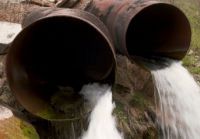

Sewage spills into England's rivers and seas by water companies more than doubled last year.
According to the Environment Agency there were 3.6 million hours of spills compared to 1.75 million hours in 2022.
Water UK, the industry body for sewerage companies, said it was "unacceptable" but the record levels were due to heavy rain.
These spills are not illegal but environmentalists say they should only happen in exceptional weather. The Environment Agency commented: "It is important to note that heavy rainfall does not affect water companies' responsibility to manage storm overflows in line with legal requirements".
The UK has combined sewage systems which mean rain and sewage share the same pipes, so if there is too much rain sewage treatment works can be overwhelmed. Sewage is spilled into waterways to prevent the system backing up.
It works out that on average last year there were 1,271 spills a day across England, compared to 825 in 2022.
Contained within the spills are human waste, wet wipes and sanitary products, which can pose a serious risk to the local wildlife, swimmers and others who use UK waterways, as well as cause blockages of the sewage system, potentially leading to even more spills.
The rain can help to dilute the sewage but academics warn there is still a risk to the local environment and anyone swimming in these bodies of water.
Dr Dania Albini, Research Fellow in Biosciences at University of Exeter, said: "Sewage pollution in the UK severely impacts waterways, with not a single river in England rated as healthy according to the latest Rivers Trust Rivers report".
She explained that sewage in rivers can reduce oxygen levels in the water which harms aquatic life and "causes sickness [in humans] due to the presence of harmful microorganisms and parasites".
The latest data, revealed by the Environment Agency on Wednesday, was taken from monitoring stations installed at combined sewer overflows (CSOs). CSOs were developed as overflow valves to reduce the risk of sewage backing up in people's homes during heavy rainfall when sewer pipes become overloaded.
The overall number of spills was expected to be higher because of the high rainfall in 2023, which was 20% above average, and for the time all 14,580 CSOs were fitted with monitors. In 2019 only 57% were fitted with monitors, so only half of spills were recorded.
James Wallace, CEO of charity River Action, told BBC News: "Water companies are not being made to invest in fixing their leaky pipes - as long as we have an Environment Agency and Ofwat that are incapable of doing their jobs then we are not in a position to expect water companies to behave".
Ofwat and the Environment Agency are both conducting separate investigations into England's nine sewerage companies, with the outcome of those expected this year. But these two agencies are themselves under investigation by the independent Office for Environmental Protection who are concerned they have interpreted the law incorrectly on sewage discharging, allowing spills whenever it rains rather than only when there is "exceptional" rainfall.
For more information on this subject, see: